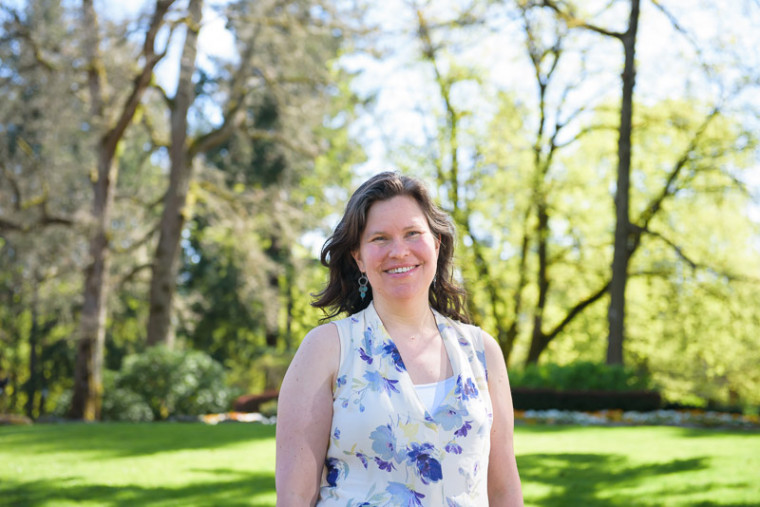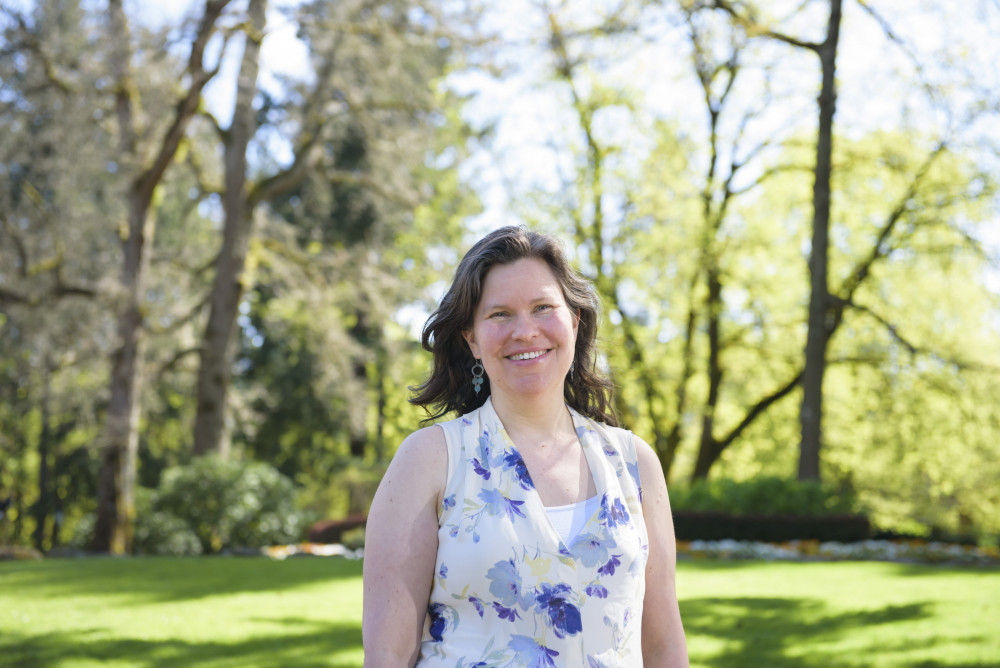Hilary Martin Himan


What three words would you use to describe Lewis & Clark?
Aspiring, transformative, resilient
Describe your job.
I’m the Chamberlin Social Justice and Faith in Action Coordinator for the Office of Spiritual Life. The job title always makes me chuckle because it’s so long. The Chamberlins’ philanthropy from back in 1979 still allows the Office of Spiritual Life to host speakers from the Abrahamic faith traditions (Islam, Judaism, and Christianity) to address social justice concerns. Part of my role is helping facilitate the Chamberlins’ vision with spirituality and social justice programming. Other parts of my current position involve serving as an advisor to Spiritual Que(e)ry, a student organization looking at the intersection of spirituality and gender and sexual diversity, and facilitating interfaith/multiple worldview conversations, dialogues, service work, and field trips.
What do you like best about your job?
I really enjoy collaborating with students in creative ways toward making positive change. For example, during the presidential campaign myself and many of my colleagues in the Office of Spiritual Life were concerned with increasing reports of hate crimes toward Muslims. I organized a panel discussion on Islamophobia, and consequently developed great relationships with a couple of student leaders to continue to educate the Lewis & Clark campus about Islam. Together we developed a visit to a local mosque, an interfaith Qu’ran study, and a Living Islam series. My work with the student group Spiritual Que(e)ry also brings me great joy. The student leaders always astound me with their reflections and resilience. Our annual retreat brings a time for sharing, noticing the good, and celebrating. Together we ask the “big questions”—which sometimes our harried, day-to-day lives don’t leave room for. My job allows me to make a difference, be a life-long learner, and work for transformation—even in the smallest increments. Perhaps that is what I like best!
What makes Lewis & Clark special?
It’s hard sometimes to answer that question regarding an institution like a college. I tend to think of specific people within Lewis & Clark that make it special, because ultimately it’s individual people that transmit the best of what the collective of L&C has to offer. I think of one of our groundskeepers and her practical, “beyond-her-job-description” efforts to really work for the environment and upcycle/recycle other people’s trash. I think of one of our alumni, who hustled, educated, and protested to have L&C withdraw from investing in fossil fuels. I think of our ombudsperson, whose heart is so big for those who need support. There are some gems at Lewis & Clark that you just need to make time to get to know. Lewis & Clark’s special character shines through its people.
Why do you choose to work at a liberal arts college?
I personally went to two liberal arts colleges as an undergraduate—it’s a culture I know and value as a student affairs and religious/spiritual life professional. As one who also cares about the holistic wellness of a student, which includes spiritual wellness, I can more easily support that vision on a liberal arts campus than at a state school, which may not have an Office of Spiritual Life. I also believe strongly in a liberal arts education, and enjoy the kind of students that land at a school like Lewis & Clark.
What do you think the benefits are of a liberal arts degree?
A liberal arts education really shapes an individual into a global citizen, who is curious and aware of people who are different from them. A liberal arts education encourages critical consciousness, the ability to dialogue and recognize multiple points of view, and the ability to discern fact from opinion. Someone graduating with a liberal arts degree often has the ability to do a number of things well, because they have been taught how to think, how to critically consume media, how to communicate effectively, and how to be a well-rounded individual. College is an important time to not dial it in too strictly, as interests and passions can change and develop. A liberal arts education expands the fertile ground for growth in ways other pre-professional educational programs limit. I hope my two kids have the disposition to pursue liberal arts degrees.
What are the biggest challenges faced by most first-year students?
I think first-year students need to know that it’s a challenge finding your niche initially. Once you do, things will click. But that first year, especially socially, might be a little awkward. You might be friends with people out of convenience because they live next door to you in your residence hall and not because you’re true kindred spirits. But eventually, you’ll find your people. Be patient. Don’t give up on who you were before you came to Lewis & Clark. Sure, it’s a time to reinvent yourself if you want, but there are some core values and identities that remain true. You will find your friends more easily when you are authentically you. Trust in that.
What advice do you have for incoming students?
Ha ha. See above. And, I would add, take time to pause, to breathe, to notice the sky, to ask the big questions of “Why am I here?” “What’s my purpose?” “What brings me joy?” “What do I not know?” As someone wise once told me, “Make despair unconvincing and hope practical.” Go to bed every night thinking of something or someone you’re grateful for. Even on the dreariest of Portland days, that ritual helps me immensely!
More Admissions Stories
Admissions is located in Frank Manor House on the Undergraduate Campus.
MSC: 32
email admissions@lclark.edu
voice 503-768-7040
fax 503-768-7055
Vice President of Admissions and Financial Aid
Eric Staab
Admissions
Lewis & Clark
615 S. Palatine Hill Road MSC 32
Portland OR 97219

